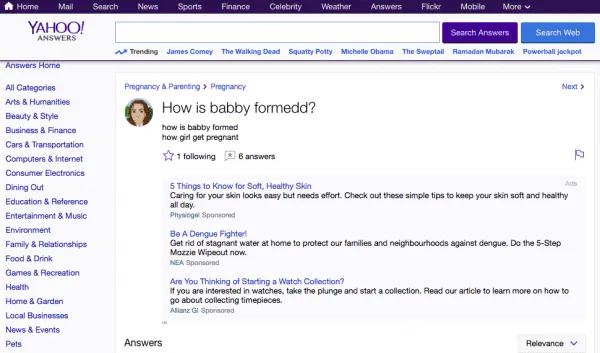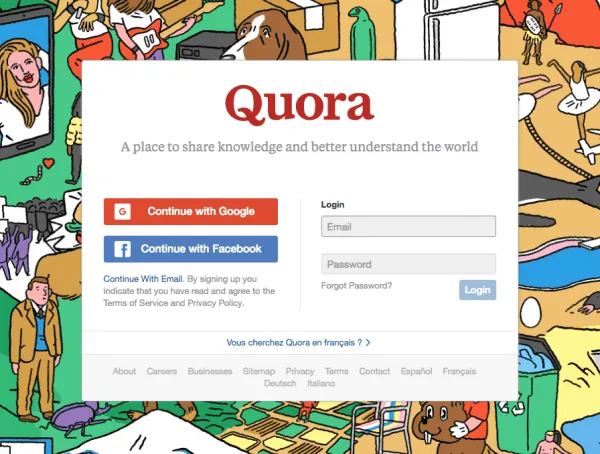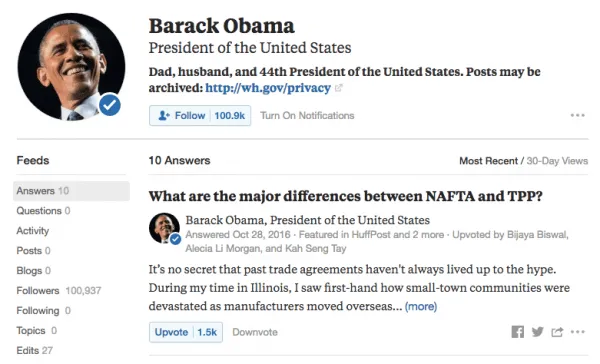
Q&A sites are not a new idea. In fact, since the beginnings of the web, the Internet has been populated by tons of Q&A sites like Yahoo Answers and WikiAnswers.
Not only that, in 2010 (before Quora was released publicly), tech giants Google acquired Aardvark, a social search service that connected users live with friends who were able to answer their questions.
In the same year, Facebook also rolled out Facebook Questions, a Q&A service that allowed users to poll the entire Facebook-verse.
As you may have noticed by now, the Q&A world is a lucrative place to be in.
However, despite such intense competition, Quora managed to launch publicly to a media frenzy in 2010.
And 7 years later, Quora is now a social behemoth boasting an impressive 300 million unique visitors a month, up from just 80M in 2017. Quora today boasts over 400,000 different topics and a valuation of US$2 billion.
Not only that, but it's also thriving as a mobile masterpiece, with over 40% of traffic coming from mobile and tons of social sharing.
How did Quora manage to grow so quickly despite having so many competitors?
Have you ever seen a Yahoo Answers’ interface?

It is both ugly and outdated-looking. And yes, it is also lacking in quality. Instead of rewarding the best answers, Yahoo Answers favors people who have posted more, even if they did not answer the question.
Thus, users of Yahoo Answers are motivated to answer in quantity, not quality. Users have answered troll questions with equally trollish answers, birthing both absurd and hilarious content.
https://www.youtube.com/watch?v=Ll-lia-FEIY
Yahoo Answers also encouraged anonymity, which allowed answers to give poor answers without any repercussions.
Quora, with the benefit of hindsight, went the opposite direction. Adam D’Angelo, CEO of Quora has said repeatedly that the entire team is solely focused on making a great product.
A: Quora Requires Your Real Name
Instead of signing up for an account with a fake username, Quora requires you to use either your email, your Google account, or Facebook account.

Because their names are now published publicly with every answer they post, users have become responsible for their answers. Trolls have been all but eliminated.
B: Quora Implemented The Upvote System
The upvote system, originally pioneered by Reddit, helped Quora moderate the quality of answers. Instead of prioritizing “clout” or “authority”, the upvote system allowed users to vote on the best answer to the question.
This immediately pushed the best answer to the top, while answers that lacked effort remained unseen.
C: Quora’s Onboarding Process Is Easy To Follow
The biggest problems faced by many companies is abandonment rate - basically people who are interested in your product, set it up halfway and abandon it.
This is often due to a clunky onboarding process that disorient users and confuse them.
To help solve that, Quora has made it relatively simple to sign-up using Facebook Connect.
Quora also prompts you to find friends, find people to follow and find topics to follow -- actions that slowly build up to a great experience at Quora.
D: Quora Focused On Building A Community Of Smart And Educated People
Low-quality answers were the bane of Quora’s predecessors. Instead of receiving genuine answers to their questions, Q&A sites like Yahoo Answers got ruined by trolls.
Besides that, people do actually enjoy hanging out with smart, like-minded people. MarkGrowth, a Medium publication interviewed Jeff Meyerson, an ex-professional poker player who frequented a forum called Two Plus Two said:
“They were these highly intellectual, meritocratic forums where poker players would discuss how to play the game on a professional level. And the calibre of conversation and intellectual maturity that people rose to on Quora was something I hadn’t encountered on an online forum since Two Plus Two. It was a really exciting experience to find a community like that once again.”
Thankfully, due to Charlie Cheever and Adam D’Angelo’s illustrious background, Quora was able to attract high-quality answers from their Silicon Valley friends who were interested in try out a new product.
Word-Of-Mouth Tip: People will only spread word-of-mouth about you if you have a great product and care about them!
Not many know this, but Adam D’Angelo was previously Facebook’s CTO while Charlie Cheever was previously a manager at Facebook in charge of Facebook Connect.
When D’Angelo quit Facebook in 2008, there were already a huge media buzz surrounding him. While it wasn’t publicly announced at that time, D’Angelo had actually quit Facebook to begin work on Quora.

Given the background of the 2 founders, they did not have problem raising media attention when they opened the platform publicly in 2010.
Word-of-Mouth Pro Tip: Reach out to your network. You’ll never know who amongst your network has the star power or influence to help you drive word-of-mouth or even become a brand ambassador.
When asked on Quora on how they kicked off the Quora platform, Adam D’Angelo flatly said:

And it’s true.
Quora is a platform that appealed to people in multiple verticals, each wanting to use Quora for their own purpose. This, in turn helped fuel Quora’s growth as they told more of their friends about it.
A: Journalists
Journalists love Quora because it is a source of inspiration. Where better to look for stories or find first-hand opinions from leading experts than a platform curated for that purpose?
MG Siegler, a reporter at TechCrunch even wrote an article discussing how journalists routinely use Quora for story inspiration:
“We don’t do that type of full republishing, not because we think it’s bad, it’s just not what we do. Instead, when an interesting Quora thread pops onto my radar, I like to think it over and write it up in a way that I would any other story. That is to say, I like to inject my own words and opinions and expand on the thought.”
B: Startup Founders
Things change quickly in the startup world. The latest information today could be the most outdated information tomorrow.
These rapid changes cause a gap of information about how to build and scale startups, which result in huge demands for such information.
On the other hand, successful startup founders were also looking for a way to tell their story of how they succeeded.
From Wired:
Detailed histories of relatively new companies such as PayPal were very popular early on, Cheever says. "That stuff hadn't really been written down yet. It might have faded into the sands of time." Foursquare CEO Dennis Crowley, who already has several thousand followers on Quora, says: "It's a nice, structured way to tell the story of how we got started to folks looking for advice."
C: Professionals
By answering questions on Quora and giving detailed answers, the platform allowed professionals like lawyers and doctors to build thought leadership and authority in their respective fields.
D: Celebrities

Quora also served as a platform for celebrities to build awareness for their upcoming projects. Celebrities also benefitted from leaving ONE definite answer for recurring questions they receive from fans.
E: Marketing Experts
Marketing experts who are trying to build awareness to their products and services love Quora because of the number of pageviews their content can generate -- and also the fact that many Quora answers are ranked highly on Google.
These separate groups of people, in order to maximize their use of the platform, began telling their peers about Quora and subsequently grew Quora’s userbase.
Word-Of-Mouth Pro-Tip: Does your product help many people? Can you identify them and empower them in different ways to help you spread the word about your product?
A little story by Landon Howell (incidentally from a Quora answer) is a sign of how Quora treats its power users:
“For example, I posted a mere 50-ish answers on Quora before I was thanked and approached for Beta testing by Marc Bodnick, Kat Li, and Nick Huber (among others). Many of my contributions were retweeted by Quora, which told me that they appreciated my work and were dedicated to promoting quality content.”
In 2012, Quora rolled out a Top Writers Program, where they recognized individuals who made the most valuable content contributions to the platform.
[caption id="attachment_22481" align="aligncenter" width="399"]

Image: Kasee Sreenivas[/caption]
The Top Writers were given a badge on their Quora profile and were also given Quora-branded clothing and books. They were also invited to events where the Top Writers could meet each other in person and build relationships.
Once made to feel special, these Top Writers would continue to contribute to the platform and create great, quality content. The presence of great content will then draw more people in into using the Quora platform.
Poof! Viral loop built.
Fun Fact: Our blog editor Visakan was also a Quora Top Writer.
Word-of-Mouth Pro Tip: Reward your best customers, as they are the ones most likely to refer people to buy more of your products.
It’s no secret that media companies love Quora.
Quora is an amazing resource for journalists, bloggers and editors looking for exciting, untold stories.
One Forbes contributor, Bruce Upbin even wrote about how obsessed he was with Quora.
Similarly, Quora is not ignorant of the fact that many editors from major media companies are lurking or participating in the platform.
It was basically a match made in heaven.

In 2014, Time Magazine announced a content partnership with Quora where the media company would syndicate Quora’s answers onto their blogs. Prior to that, Quora had already partnered with NPR, BBC, BuzzFeed and The Huffington Post.
(Quora would later also have their own columns on Forbes and Inc.)
It was a win-win situation for both parties. Media companies like Time are starved for online content, and they need people to churn out articles day after day. Quora provides a platform for them to generate content that is sure to be popular.
By virtue of being published on these giant media outlets, Quora was able to gain attention and awareness to their platform. The partnership also meant that Quora is able to incentivize writers with the “carrot” of possibly being published on these media outlets, thus generating better content.
Word-of-mouth Pro Tip: You don’t have to do this alone. Partner with companies in similar verticals as you to reach more people and get them interested in your company.
One of Quora’s attractiveness is its ability to attract high-profile influencers to answer questions.
Quora users include big names like Facebook’s Mark Zuckerberg, Foursquare’s Dennis Crowley, Wikipedia’s Jimmy Wales and ex-US President Barack Obama. It was an knowledge-hungry person’s idea of heaven -- delicious bits of information served right from the horse’s mouth on a silver platter.
When these influential names answer a question, they would in turn share them with their followers. This exposed the platform to many people who were otherwise unaware of the presence of Quora.
To capitalize on these influencers’ ability to drive visitors to their platform, Quora also launched Quora Writing Sessions, their own version of Reddit’s Ask Me Anything.

Several days before, Quora will announce a Writing Session by an influential person, and users can then leave their questions on the page. The influencer would take several days to prepare for his/her answer and then post it on the Writing Session page.
This basically pushed influencers to promote their Writing Sessions, which drove herds of people to the platform to read these influencers’ answers.
Word-of-Mouth Pro Tip: Influential people who have curated an audience can unleash the floodgates to your business. Tap on them and their audience to drive awareness to your products.
Raúl Galera is the Growth Lead at ReferralCandy, where they’ve helped 30,000+ eCommerce brands drive sales through referrals and word-of-mouth marketing. Over the past 8+ years, Raúl has worked hands-on with DTC merchants of all sizes (from scrappy Shopify startups to household names) helping them turn happy customers into revenue-driving advocates. Raúl’s been featured on dozens of top eCommerce podcasts, contributed to leading industry publications, and regularly speaks about customer acquisition, retention, and brand growth at industry events.
Grow your sales at a ridiculously
lower CAC.